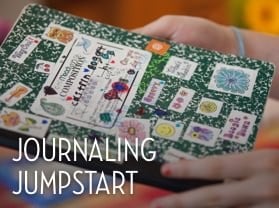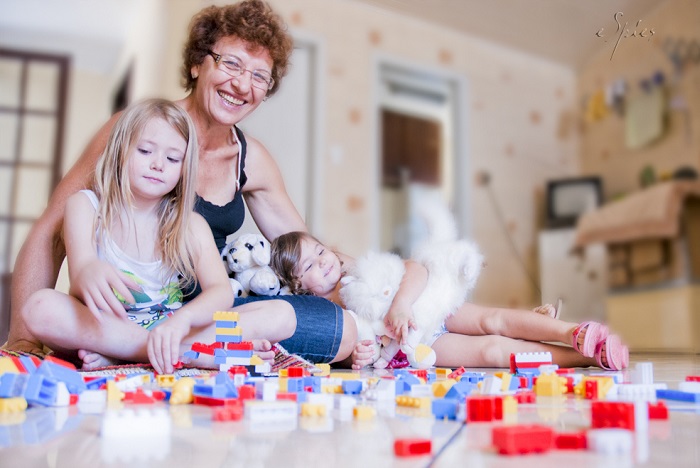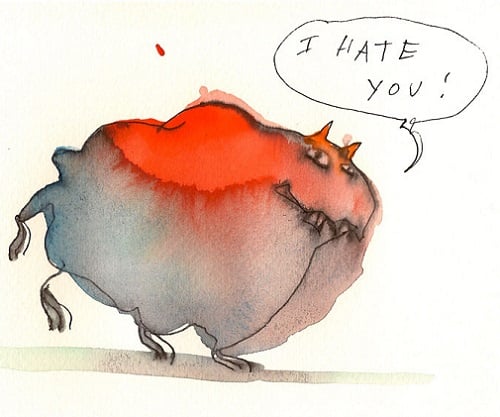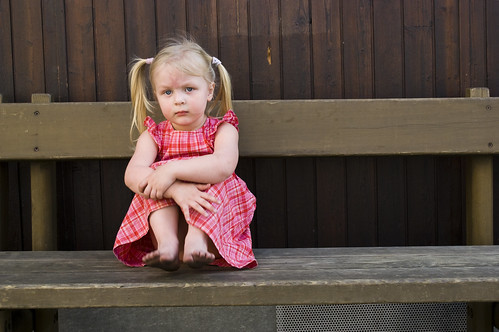Format writing teaches kids to solve the “puzzle” of the assignment rather than teaching kids to tap into their writing voices. #homeschool
— Julie Bogart (@BraveWriter) September 29, 2013
Archive for the ‘Writing about Writing’ Category
Not puzzle-solving, but voice-finding
When Your Child Writes Hurtful Words
Sometimes freewriting yields an emotional catharsis in your child. You find out that she is angry at her father for teasing her about her table manners. You discover that your son is mad at you for “making him do math.” You read that your child thinks your mother is mean or that another child calls her brother “stupid.”
It takes a big person to withstand criticism in almost any setting. But when it comes from a beloved child, it’s like running a tractor over your heart. Freewriting sometimes calls forth buried emotions, but it can also yield truths that you might not want to face.
For instance, maybe your mother was mean the last time she visited, or perhaps your spouse did cross the line from teasing to mocking and humiliated the daughter.
It’s important to stand up for reality in your family. So if your child detected misbehavior by an adult and it showed up in writing, validate it. You don’t need to pretend it away or minimize it. Simply acknowledge it:
- “You’re right. Grandma was pretty harsh. I don’t like it when she shouts either.”
- “Let’s talk to Dad. I wonder if he knows he hurt your feelings.”
- “Thanks for sharing this with me. Let’s see what can be done to repair the damage.”
If the freewriting is slanderous: “Joey is stupid” or “Mom is the worst mother in the world,” you can talk about it from a writing point of view.
Powerful writing “shows” it doesn’t “tell.”
Suggest your child lay off of the “slams” and focus instead on revealing the character of the one being accused. What can happen in those moments is powerful. Now your child is being required to find support for the assertion. As he or she does that, sometimes perspective has a way of creeping in. Maybe she discovers that Joey isn’t actually stupid, he just plays too hard sometimes and your daughter gets overwhelmed. Maybe your son discovers that what is bugging him is that he wants to play his computer game longer and you stop him for dinner. Now you have a real problem that can be addressed and solved, rather than name-calling.
Use this kind of writing to heal pain and damaged relationships. Honor it. Don’t judge it. Never require anyone to write only edifying depictions of others. Some of the best writing is the accurate recognition of another person’s flaws. Learning how to depict those with care is the challenge. If the writing is a veiled plea for support and love, take care of that too.
Image by waltercolor (cc cropped)
Remembering the Lock ‘n Key Diary

In 1970, I turned 9 years old and entered 4th grade. My November birthday brought a brown paper package from Chicago to Los Angeles from my Grandmother. I ripped it open.
A red diary with gold leafing! A golden metal lock clasped it shut, and a tiny matching key on a red string was Scotch taped to the cover.
Magic.
I knew one thing about diaries. They held secrets. With a lock and key to protect them, there was no limit to the private thoughts a 9 year old could scribble onto its pages!
I tested the key. It worked! The stiff edges crackled as I thumbed them looking for November 7. I cloistered myself in the corner of my bedroom, door closed, and picked up my pen to write…nothing.
Nothing.
I had no secrets. It stunned me to discover that I had been on the planet nine whole years and I had not a single thought or private wish that needed safe-keeping. I closed the diary in defeat.
I stared blankly at a sky blue wall.
Then a thought dawned—maybe inspired by the color red, the gold leafing, or the desperate internal search.
Love.
Diaries are records of secret crushes!
I broke open the seal again, and enthusiastically began my first entry:
“I love Scott Halstead.”
Whether I did actually “love” Scott or not was entirely beside the point. I could now write about emotions that I didn’t want my brother to read. Victory!
The following pages mused whether or not to give Scott my baseball cards (I had two), how to show him I loved him (I never mustered that courage), and what he might say to me if we ever exchanged syllables.
The first month of entries is a torrid private fantasy of benign interactions between two kids—with a surprising number of misspellings for being an A student speller in school. My handwriting is slope-y and jumbled, and I believe I thought it was beautiful at the time.
I kept up the daily entries for a few impressive months and then the crush wore off with none to replace it, and my thoughts became mundane.
There’s quite a drought of entries after Christmas. Then, on February 9, 1971, an earthquake struck Northridge, CA, not 8 miles from my home. We felt the full force of that quake. Walls split in our neighbor’s house, dishes burst from cabinets and crashed to the ground, beds slid across floors, and our little Boston Terrier leapt over her gate to tear into our bedrooms.
My brother, 7 years old at the time, felt the rocking house under him as he woke up and we could hear him (standing) on his bed shouting “Ahoy Matey!” I made the uncertain, slingshot, stumbling journey from my room to my parents’ bed, while the house creaked and groaned and threw me against the walls.
I wrote about it the next day, in my diary.
Not too many words, but enough to see my perspective at nine, of this big event that I’ve never forgotten.
It’s funny how I thought my secret crush was the point of the diary back then, when today I see it as this “witness to history” moment, afforded me by the seduction of gold leafing, and a lock and key, and the wonderful way writing is and has always been there for me.
I smile when I see it now. My grandmother wrote poems in an era when women didn’t work or publish much, but she assumed I’d write. My mother became a successful author. I teach writing. My daughter writes poems and teaches writing. We all journal.
The beat goes on…
Just felt like thanking the genius who put gold edges and locks and keys on red diaries. I don’t know what kind of writer I might have become without mine.
 Journaling Jumpstart guides students to explore various methods of journaling, all while challenging them to build a pattern of regular journal-keeping, no matter what the style.
Journaling Jumpstart guides students to explore various methods of journaling, all while challenging them to build a pattern of regular journal-keeping, no matter what the style.
“The best time to begin keeping a journal is whenever you decide to.” (Hannah Hinchman, A Life in Hand)
This class is perfect for middle school, junior high, high school, and beyond! It would make a great first independent online class for middle schoolers or a great family project (parents included!) to start the new year journaling together!
Header image by Hannah G
Are We Having Fun Yet?
When leading new teacher training, the topic of “fun” surfaced which made me think about that word and how I feel about it. Everyone wants to have “fun”—”fun” is the word we use to describe our happy experiences. Fun is free, happy, includes laughter, involves increased heart rates, lightheadedness, and the belief that life is good, right now.
But what happens when we say to our kids or friends:
“This experience is going to be fun”?
I know for me, when someone tells me to expect that an outing or event will be fun, a little part of me tightens. I wonder if I’m being tricked into an experience I don’t really want to have, or if I’ll be required to say I had fun because I wouldn’t want to hurt anyone’s feelings. I wonder what happens if the event isn’t fun for me. Do I have a way to stop being a part of it?
There are times when the promise of fun is wholly justified. If a friend calls and says, “Let’s go surfing! It will be so much fun!” I’m likely to agree happily. But if right before spring cleaning, my spouse says to me: “You know we’ll have fun washing the windows,” part of me feels, well, manipulated. What if I really hate window-washing? Just white-washing it (ha!) with the word “fun” isn’t going to change that. I want it understood that I have a genuine feeling about it and I don’t want someone to require me to feel what they assert.
“This is going to be fun” is a coercive statement. Therefore, I avoid making it.
The thing about children is this. We’re told that they are responsive to joy, laughter, and the experience of fun. That means, adults attempt to win cooperation from childish children for tasks that are often associated with “not fun” by promising “fun.” Corporations have figured this out. Daily vitamins, as one example, are shaped like cartoon characters and soaked in sugar to make vitamin-popping a “fun” experience.
The promise of “fun” though, can be a promise of diminishing returns. If you tell a child that the visit to the dentist will be “fun” because there will be a toy at the end of it, and instead, the visit includes painful tooth-drilling, the fun no longer stands out as the key experience of the appointment. The child learns to be cautious when the word “fun” is batted about. It starts to sound like, “This experience is not going to be fun, but we’re going to pretend it is so you won’t get mad or cry or run the other way.”
And so begin the dubious associations with the word “fun.”
With homeschool, as in life, there are tasks that are “fun” and tasks that are not. Not every task has to be “fun” in the true sense of that word, in order to be satisfying or productive or even practiced. Each person needs to have the freedom to form his or her own opinion of the subject area or how we teach it.
“Fun” needs to be experienced as a wonderful by-product when observed in hindsight: “That was a lot of fun learning about dependent clauses.” It is not likely that forecasting “fun” for dependent clause study will be met with anything but suspicion.
Rather than looking for “fun ways” to learn any subject, focus instead on teaching a subject area in a way that involves the child’s whole personality and sense of self. No one wants a subject “done to them.” No one wants to be required to enjoy a subject area.
The best learning experiences are those where the child is engaged/immersed—with his or her full powers of evaluation and capability available. Your job is to provide a stress-free, nurturing, attentive, clear environment in which that activity can take place. Fun is not essential, but when a child is fully involved, fun is a frequently cited result.
And that’s when fun is, well, fun.
Image by Clemens v. Vogelsang
Safe Space for Living = Safe Space for Writing

It’s not enough to tell your kids they can take writing risks and you’ll be there to support them, no matter what. You can promise that you won’t criticize their mechanical errors or that you are “okay” with whatever they write as long as they move the pencil. These are good practices that help to make the act of writing less daunting.
Yet a child who is used to being managed, directed, and revised in daily life will carry that feeling into the writing life; those words will not carry the message you hope to convey.
Writing is a risk. There are styles of parenting that make risk-taking more difficult for the child. To facilitate freedom in risk, children need to have lots of experiences with you, the parent, that let them know they can make mistakes, or offer you something different than you envisioned for them, or that they need time to not write for a bit.
Emotional connection creates emotional safety.
For example, if your child descends the stairs after dressing herself in mismatched top and bottoms, do you comment? Do you send her back for the “right” shirt? Do you feel disappointment? Does it show?
When there’s a mess on the floor, do you find yourself focused on cleaning it up rather than seeing what it represents?
Think back to your parents or your spouse or a school teacher. What types of comments made you nervous or left you feeling blank or closed? When did you blossom and venture to some new space for thought or activity?
When a mother tells me her daughter is a perfectionist, I often ask: “Are you, too?”
When a father tells me, “I don’t want to live through my boy, but he is capable of so much!” and then proceeds to tell me his ambitions for his son, it’s not all that surprising to me when I discover that this same child seizes up in writing, afraid to disappoint this powerful man in his life that he admires.
A habit of commenting (even in a positive tone of voice) can become a second-voice in the child’s head. Your evaluations (even when positive) can rob the child of forming his or her own. Your child starts to measure him or herself by what he or she imagines you might say, rather than feeling free to explore.
Sometimes the best way to create emotional safety for a child is to be quiet (to say nothing, to not have an opinion ar all), and at other times, it’s helpful to point the child back to his or her own experience.
For instance, you might say nothing about the outfit of choice, but you might make a comment about a child’s big mess on the living room floor: “What a lot of creativity and fun we have here!”
How you say what you say is the most important feature of this dynamic. Your tone of voice creates or thwarts your relationship of trust with your child.
I want to repeat that.
The tone of voice you take with your child,
even more than the content of what you say,
will determine how open your child is with you.
A child’s felt experience of space and safety will translate into taking risks (of various kinds) throughout childhood. Some of those risks will show up in writing.
If you find that your child is not responding to the space-creating language you use for freewriting, ask yourself if a shadow hides in your communications. Do you convey through tone or words that you have expectations for the child that feel like pressure (not like support for growth)?
How can you free up space for calm, creative, patient progress and risk-taking instead of conveying the hidden expectation of a performance that reassures you?
There are lots of reasons for writer’s block, but I wanted to point out this dynamic today. It doesn’t show up in writing manuals, but in many cases is the primary struggle. Writing is not like math pages where you can assign them and measure the number of problems completed. Writing requires an unearthing of language from within. Any time a child goes within (to create), the child unconsciously checks the space to see if “that’s allowed.”
It’s your job to allow, allow, allow in lots of areas, with genuine interest, trust, and care. As you do, lots of good stuff will show up (and some stuff you don’t want too). But that’s all part of it! You get to show your kids that it’s okay to make mistakes, to take risks that don’t pan out, and to create their own way.
You do it together. Like writing. Life life.
 Header Image by Emanuele Spies (cc)
Header Image by Emanuele Spies (cc)



















